To help dyslexic students overcome their reading and writing difficulties and develop their full potential, with a HK$153.7 million donation, The Hong Kong Jockey Club Charities Trust initiated READ & WRITE: A Jockey Club Learning Support Network in 2006.
Organised in collaboration with the Education Bureau, The University of Hong Kong, The Chinese University of Hong Kong, Heep Hong Society and the Society of Boys’ Centres, the Project has benefited over 9,000 students and provided training for 7,500 teachers, social workers and other relevant professionals. In fact, more than 4,500 teachers from 96% of local primary schools have enrolled in the READ & WRITE training programme since its establishment. New screening and assessment tools and support packages have been developed to cover students from pre-school to secondary levels.
Today (7 February), the Club’s Head of Charities Projects Rhoda Chan joined The Education Bureau Senior Specialist Doris Lee, READ & WRITE Principal Investigators Prof Connie Ho and Prof Cheng Pui-wan, Heep Hong Society READ & WRITE Project Manager Rachel Leung and Heep Hong Educational Psychologist Rex Wong at a press conference to recap the achievements of Phase 1 and unveil details of Phase 2, which will include addressing the needs of pre-school children, offering parent support and providing training for teachers and educational psychologists.
A Phase 1 study found that about 25% of pre-school children in Hong Kong were at risk of suffering reading and writing difficulties in Chinese. Ms Chan said the Club had always placed great emphasis on Hong Kong's educational needs. "Early intervention for young children at risk of suffering dyslexia can help their future development greatly. We hope the extension of READ & WRITE will provide proper assistance to kindergarten children with reading and writing difficulties, at the right time," he explained.
Elaborating on the achievements in Phase 1, Prof Ho commented, “Over the past few years, we have successfully increased public and teacher awareness in identifying and supporting children who have reading and writing difficulties. We have also developed a Tiered Intervention Model for Chinese Language Learning for primary schools; empowered front line professionals and teachers to participate in the support of dyslexic children; and developed screening and assessment tools.”
She also noted that over 100 primary schools had learnt how to use the standardised assessment tool of the Intervention Model to screen and monitor the progress of children with reading difficulties. Around 21% to 24% of children with reading and writing difficulties, who originally fell below the benchmark, had now reached the benchmark of Chinese literacy after receiving the intervention for one year.
In the new phase, more than half of Hong Kong’s educational psychologists and trainees will be trained to facilitate implementation of the model in order to provide adequate support to dyslexic students. The model has already been implemented in over 35 primary schools between 2006 and 2011. The Education Bureau will now adopt and run it until 2016 in 200 primary schools, along with school-based support services.
Prof Cheng unveiled further details of Phase 2, noting that to sustain long-term quality support to primary students with reading difficulties, around 300 primary school senior teachers would be taught advanced level teaching skills. “Participants are guided to develop coaching and training skills so that they can become trainers for colleagues and parents in the schools they serve. It is anticipated that our teacher development programmes will enable teachers to offer substantial support to students who are in need as early as possible, she said.
“Besides this, READ & WRITE offers courses for parents to be trained in assisting dyslexic students. Enrolments totally 800 person-times have been made into the courses,” Prof Cheng added. She noted pre-school support would be strengthened in Phase 2. Since July 2012, over 500 kindergarten principals and teachers have enrolled into the Teacher Training for Kindergarten Principals and Senior Teachers. Moreover, some 500 kindergartens have received the Preschool Language Learning Package developed by the Project Team, and nearly 600 children will benefit through the school-based support scheme.
Other than school-based support, Heep Hong Society and its partner will also provide centre-based support in the community. Around 400 pre-school children will be benefited. A new Language Learning Activity Handbook for Preschool Children will be published and distributed to 1,000 parents, with the aim of equipping them with the knowledge and skills to help their children.
The READ & WRITE pre-school learning package has already spread beyond Hong Kong, having been recently adopted by The First Social Welfare Foundation in Taiwan, which will distribute some 1,000 sets of learning packages to teachers, parents and NGOs in Taiwan. For more information on READ & WRITE, please visit: http://www.fed.cuhk.edu.hk/~jcrw/
The Hong Kong Jockey Club
Founded in 1884, The Hong Kong Jockey Club is not only one of the world's leading horse racing organisations but also a world top 15 charitable organisation and Hong Kong’s largest community contributor, donating HK$1.7 billion in 2012. It is also a major taxpayer, Hong Kong's single largest by far, generating over HK$16 billion a year for public funds. The Club pioneers technology applications for sporting and betting entertainment, striving for the highest levels of customer service. As a membership club, it is recognised as one of Asia’s most prestigious, with more than 23,000 members. These multifaceted roles make it a well-respected and remarkable organisation, dedicated to its mission of enhancing the quality of life for all Hong Kong people.
Attachment:
READ & WRITE: A Jockey Club Learning Support Network Factsheet
|
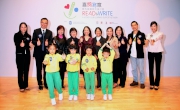
The Cluba£á?s Head of Charities Projects Rhoda Chan (back row 3rd left) joins The Education Bureau Senior Specialist Doris Lee (back row 4th left), READ & WRITE Principal Investigators Prof Connie Ho (back row 5th left) and Prof Cheng Pui-wan (back row 5th right), the Education Bureau Educational Psychologist Michelle Chan (back row 1st left), Heep Hong READ & WRITE Project Manager Rachel Leung (back row 4th right), Heep Hong Educational Psychologist Rex Wong (back row 2nd left), Tin Shui Wai Government Primary School teacher Lai Shuk-Chun (back row 3rd right), READ & WRITE beneficiary So Wai-Hung (back row 2nd right), Healthy Kids Nursery School teacher Lee Pui-Wah (back row 1st right) and students at the READ & WRITE press conference.
|
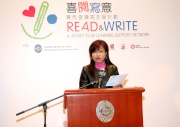
The Cluba£á?s Head of Charities Project Rhoda Chan says early intervention for young children at risk of suffering dyslexia can greatly help their future development.
|
|
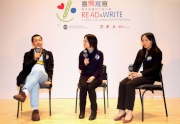
Tin Shui Wai Government Primary School teacher Lai Shuk-Chun (centre) has been using the Tiered Intervention Model for Chinese Language Learning for three years and says it has helped enhance studentsa£á? reading and writing ability, concentration and eagerness to learn. So Wai-Hung (left) says he didna£á?t know how to handle his dyslexic son before. But with the help of his sona£á?s teacher and READ & WRITE teaching materials, his son can now read and write better.
|

Photos 4/5:
Students from Healthy Kids Nursery School demonstrate games developed from the READ & WRITE learning package.
|
|
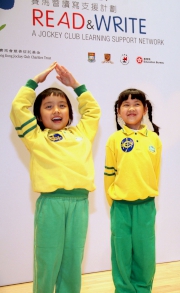
|
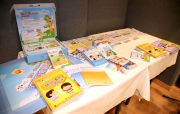
READ & WRITE learning package.
|